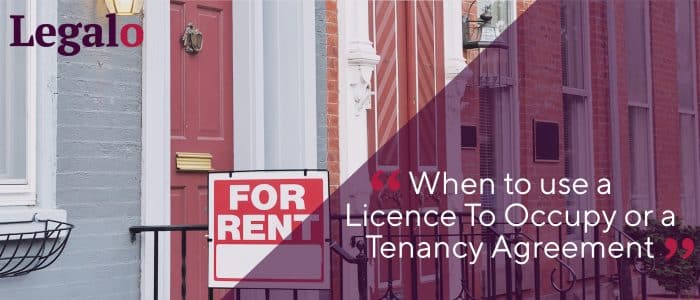When to use a Licence To Occupy or Tenancy Agreement
Posted by David Cammack on October 28, 2022

Should you use a licence to occupy or tenancy agreement? We often encounter people either:
(a) referring to a licence to occupy residential property and a residential tenancy agreement interchangeably, or
(b) having difficulty in deciding which agreement to use.
However, they are actually two very different contracts. In this article we detail the differences and explain when to use one or the other. There are various factors to take into account when making this decision.
Exclusivity of use
With a licence to occupy, the licensee is granted permission to use all or part of the property on a non-exclusive basis. This means that the owner of the property is also allowed to use the property at the same time.
From a legal perspective, the licensee does not have any legal interest in the property; just permission to make use of all or part of the property, subject to any reservations in the licence agreement.
With a tenancy agreement, the landlord grants exclusivity of occupation to the tenant. This means that the landlord cannot use or access the property without the tenant’s consent, subject to common exclusions found in a tenancy agreement, such as:
- the right to enter, with notice, to make regular inspections or
- the right to enter for emergency repairs.
If it is intended that exclusivity to use the whole property be granted, then a tenancy agreement is the appropriate document to use.
If exclusivity of just part of a residential property is being granted (for example a bedroom in an HMO), then either a licence to occupy or a lodger agreement (if the landlord or a close member of the landlord’s family lives at the property and some key rooms are shared, e.g. bathroom, living room or kitchen) is more appropriate.
For more on this point, as a legal issue, read Wikipedia.

Length of term
It is common to use a licence to occupy:
- for short-term arrangements (say, up to 12 months), or
- where a fixed term is not acceptable, e.g. the owner gives permission to use and occupy the residential property on an ongoing monthly basis.
In such circumstances, the licence will state the amount of notice that either party must give to terminate the licence.
For longer-term arrangements (6 months plus), you might want to consider an assured shorthold tenancy agreement.
If a licence lasts for a long time, the Courts might decide at some point it became a tenancy. Then any eviction process is more involved and the occupant has all the statutory rights of a tenant.
When to use licence to occupy or tenancy agreement
A licence to occupy residential property is far more informal than a tenancy agreement. The licensee will not benefit from the statutory protections given to a tenant occupying property under a tenancy agreement. For example, a more-involved eviction process and deposit protection.
With a tenancy agreement, the landlord has a range of responsibilities implied into the contract by law, for example:
- the requirement to allow the tenant ‘peaceful’ enjoyment of the property, and
- certain maintenance obligations.
Often the owner of a property will use a licence to occupy when he has agreed to share the property with a third party, and perhaps when a long fixed term is not going to be acceptable.
If you want to grant a licence to occupy to a person that will share the property with you (as landlord) and you do not want the occupant to benefit from the statutory provisions that apply to a tenancy agreement, then we recommend using our Lodger Agreement Template.
If you will not occupy the property and do not want the occupant to benefit from the statutory provisions that apply to a tenancy agreement, then use our Licence To Occupy Residential Property Template if the licence seems a genuine fit with the facts of the occupation basis.
You can use either of these templates to grant a short fixed-term period or indefinite period, i.e. a month-to-month contract.
In any other situation, or if you want to grant a fixed-term contract that gives the other person the exclusive use of the property, then we recommend using our Assured Shorthold Tenancy Agreement Template. If in doubt, it is better to opt for the tenancy agreement.
We hope this helps you decide which type of agreement to use.
